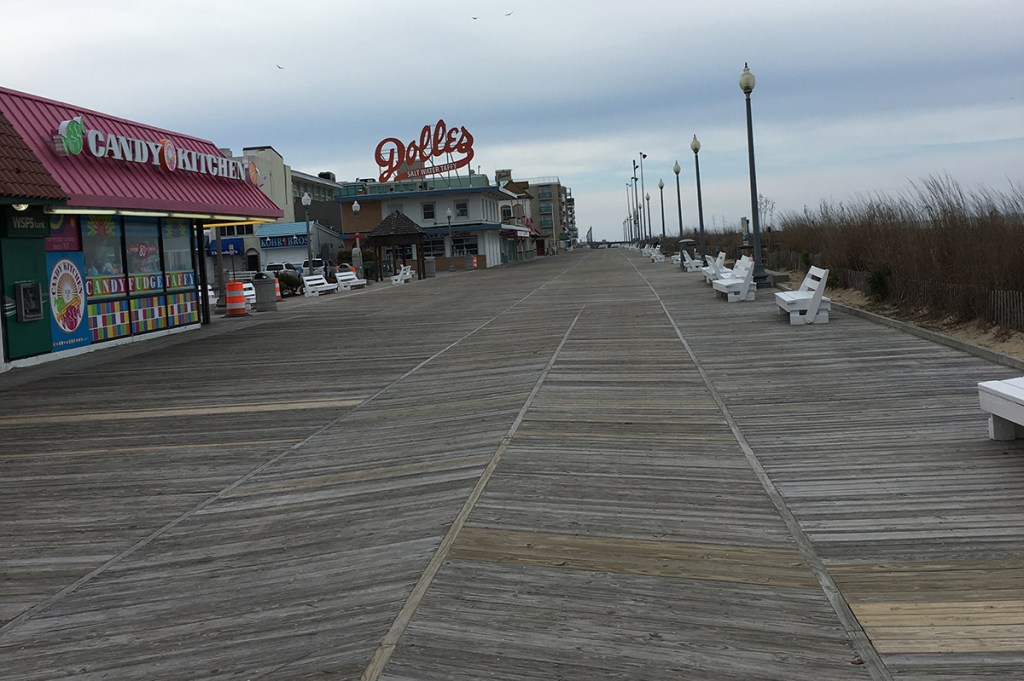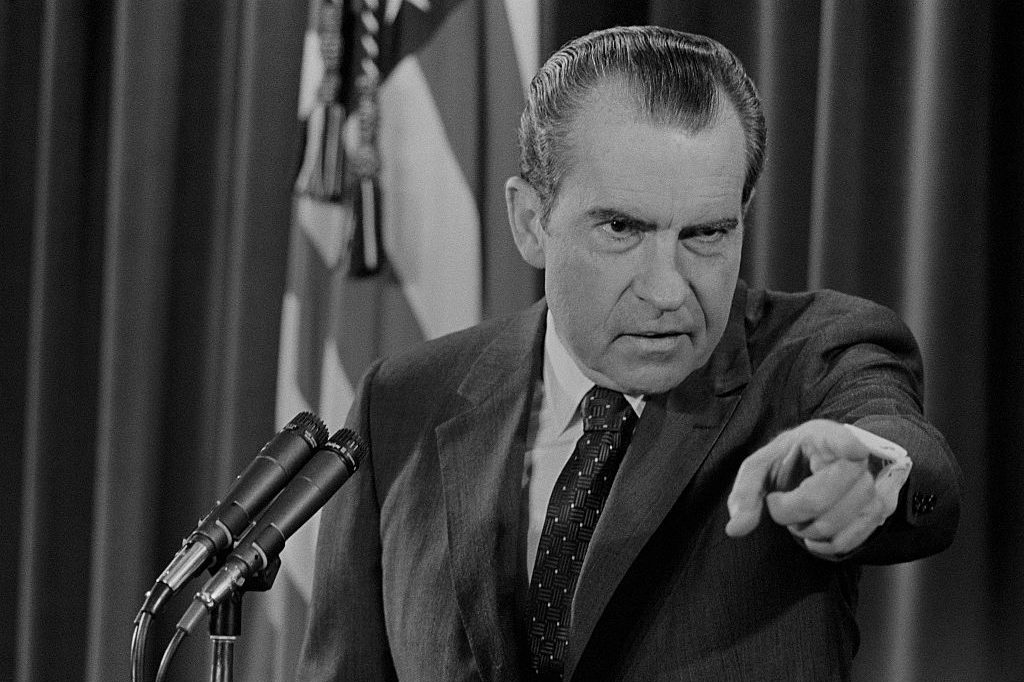One of the most eye-popping coronavirus containment measures instituted anywhere in the country can currently be found in the small, oft-neglected state of Delaware. For most Americans, if they’re familiar with it at all, Delaware is experienced only as either a pass-through for travelers on I-95 or as a domestic tax haven referenced obliquely in the text of corporate fine-print. However, there are some hidden charms: quaint little beaches and such. A pandemic would not be the most advisable time to familiarize yourself with these subtle Delawarean glories, though, because you might get pulled over for having an out-of-state license plate.
As of March 30, pursuant to an Emergency Order issued by Gov. John Carney, law enforcement officers are empowered to ‘stop a vehicle with an out-of-state license plate simply because it has that license plate and is driving in Delaware’. This dictum upends all expectations normally operative in the area of traffic law. Under typical circumstances, police are only technically permitted to pull you over if they suspect you of committing a discernible road infraction, like speeding or unsafe lane changing. (Although practically speaking, thanks to a mountain of Fourth Amendment-obliterating case law, they generally have the authority to pull you over for any reason at any time.) But now, the only legal pretext required for initiating a traffic stop in the state of Delaware is not having a Delaware license plate.
Graciously, the Emergency Order exempts out-of-state motorists traveling on the main interstate highways: I-95, I-295, and I-495. But on a recent drive over the Delaware Memorial Bridge from New Jersey, I observed no signage warning motorists that they risked a police confrontation if they dared venture out onto the lesser county roads — as is required to get to Rehoboth Beach, one of the state’s small handful of charming destinations.
Officially billed as Delaware’s ‘most visited city’ on account of its ‘warm sunshine, sandy beaches and ocean breezes’, Rehoboth Beach is a family-friendly hotspot for would-be vacationers throughout the Mid-Atlantic region. Citizens of Pennsylvania, Maryland, Virginia, Washington, DC, and thereabouts frequently flock to its shores when the weather is good. But not this year — unless they want to evade the cops.

Making state borders the focal-point for traffic enforcement seems especially arbitrary and bizarre in the case of Delaware, which is the second-smallest state by landmass. Being in Rehoboth Beach is not like being in the middle of Texas. In fact, if you are in Rehoboth Beach, you are only around 25 miles away from the border with Maryland. Some people have learned this the hard way, such as an individual who works at Nicola Pizza — the premier pizza place in town. The employee, who declined to be named, recalled being pulled over recently on his way to work. He said he lives in Ocean City, Maryland — just a 30-minute drive south on Coastal Highway — but per this new governmental directive, his out-of-state license plate provided sufficient justification to authorize the traffic stop.
The employee said he provided the attending officer with adequate documentation identifying himself as someone legitimately traveling to his place of employment — as opposed to just going out for a leisurely drive — and he was free to go. Still, what is the fundamental legitimacy of such exercises in state power? Especially given the ever-present possibility that traffic stops could escalate into arrests or worse…
Lt. Jamie Riddle of the Rehoboth Beach Police Department told me that his officers were approaching these stops as ‘consensual encounters’ (an interesting phrase). As such, they were being handled much differently than average traffic stops. ‘I think that’s where a lot of the miscommunication came in,’ he said — the perception that if you enter Delaware from out-of-state you’re immediately going to be bombarded with ‘red and blue lights everywhere’. Instead, he explained, the bulk of the enforcement has been via ‘checkpoints’ conducted in conjunction with the Delaware State Police, where according to Riddle, ‘every car got stopped’.

One person who said she was subjected to just such a ‘stop’ was Katie Caddigan, a senior at the University of Delaware. She told me she got pulled over on April 8 while driving with her mother from Maryland to Fenwick Island, a small town just south of Rehoboth Beach. It was at one of these so-called ‘checkpoints’ that drivers were being ‘consensually’ waved over to the side of the road for mandatory police questioning. The two had been hauling a car full of furniture for her parents’ move, Caddigan said, and produced documentary evidence confirming the purpose of their trip. ‘However, before we provided proof we were grilled with a number of questions regarding why we thought our travel was essential,’ she recalled. ‘The officer went on to explain that many people had been given the minimum $500 fine that day.’
At least according to the public promulgations of the Delaware state government, $500 is in fact the maximum fine for violations of the governor’s Emergency Order, not the minimum. So it’s possible the officer was just blowing a bit of intimidatory smoke. It would be nice to know how many people actually received these exorbitant fines, and for what specific violation. Unfortunately, however, the relevant state agency declined my FOIA request. (I’m appealing.) More disconcerting is the concomitant threat of arrest and jail, which is also provided for in the Emergency Order. Of the roadside encounter with the officer, Caddigan said she and her poor mother were threatened with ‘possible imprisonment’ for engaging in non-essential travel. ‘The cop was never nasty with us,’ she said. ‘I get he was being straight forward, and doing his job. But it was a pretty wild experience.’
It would be fair to call this Delaware policy ‘pretty wild’, even by the standards of the wildly unprecedented containment measures implemented elsewhere. But, as Lt. Riddle insisted to me, ‘A minimal fraction of law enforcement is trying to turn this into a violation of Constitutional rights, if any.’
That’s probably on some level true. Nobody’s excited about dealing with a global pandemic, and most people are just trying to manage it as sensibly as they can under the circumstances. However, simply by nature of increasing the frequency with which otherwise law-abiding citizens must interact with law enforcement, you necessarily increase the likelihood of Constitutional rights being violated — or at least distress being inflicted, in the form of things like traffic tickets and arrests. Between the span of April 3 and April 13, Riddle said, 114 out-of-state vehicles were ‘followed’ within Rehoboth, while 66 motorists were ‘contacted’. And at least eight people were arrested on disorderly conduct charges for entering the boardwalk, which had been emphatically shut down. ‘We don’t want to have to arrest somebody over this,’ Riddle told me, but their hand is apparently being forced by these care-free boardwalk scofflaws. I gingerly approached the boardwalk on foot one recent afternoon. A patrolling officer warned me in not-very-nice tones that if I didn’t scram, the consequence ‘could be’ jail.
Across the country, including Delaware, citizens have proven themselves willing to make reasonable accommodations in order to mitigate a public health crisis. Sussex County has seen a reported ‘surge’ in coronavirus infections over the past few weeks, according to state authorities — mostly clustered around jam-packed poultry factories. So, there’s certainly a legitimate threat, and practical mitigative steps are warranted. But when government-imposed containment measures increasingly appear arbitrary, resentment is bound to fester. Informal surveys I conducted of people at various convenience stories, Walmarts, and take-out restaurants around Rehoboth indicated that almost everybody had heard of the traffic stop initiative — friends, relatives, etc. having been pulled over — but they were unclear on what the exact penalties were or how it was being enforced. Naturally, rumors have also been flying online.
The often hard-to-follow logic around coronavirus containment isn’t even limited to the realm of public policy: corporations have also instituted head-scratching new protocols. In Rehoboth, for example, Choice Hotel chains feature signage announcing that ‘due to COVID 19 concerns’, front desks will operate on limited hours, from 9 a.m. to 1 a.m. Not that the daily shifts of random hotel clerks are anyone’s idea of a gravely important issue right now, but what ‘concerns’ are exactly mitigated by virtue of the front desk not being occupied during those particular hours? I posed this question to various staff and nobody had a good answer, because the rationale hadn’t been explained to them either. The protocols are just summarily imposed from on high — another addition to the ever-growing patchwork of confused and confusing orders that make up the nation’s collective coronavirus response.
Of course, it’s hard to be too harsh about this. We are in the middle of a global pandemic, caused by a virus whose pathology and modes of transmission are still poorly understood. Given those confusing circumstances, we would have to expect an unavoidable spate of confused or muddled public policy responses. And that’s certainly been the case in little old Delaware.
But some of this stuff is still just inexplicably weird. If you head to nearby Cape Henlopen State Park, for instance, signs declare that dog walking, surf-fishing, and ‘exercise’ are permitted on the beach — but all other activities are prohibited. (‘NO SURFING’, declares the sign in big bolded red letters.) Natural followup question: Does plain old walking constitute ‘exercise’? And if you allow walking under the ‘exercise’ rubric, isn’t the beach just effectively open to all? Google Maps described the park as ‘temporarily closed’, but at least on Sunday, April 26 there were plenty of beach-goers out and about, with no apparent monitoring from any government regulators. Small groups of people were sitting around and recreating as normal.
According to the signs, these confusing restrictions will stay in place ‘until the public health threat of COVID-19 has been eliminated’. But whether the threat can ever be fully ‘eliminated’ seems highly doubtful, if not impossible. The point of the current containment measures, I had thought, was to mitigate and manage the threat — not extirpate it entirely. So what’s the deal? Well, the deal may simply be this: local governments are issuing heavy-handed public pronouncements to discourage people from gathering in large numbers, but aren’t actually using heavy-handed tactics to enforce anything. Which may be the most sensible balance under the circumstances. It’s hard to say with any precision either way, due to lack of complete data. I do know that I drove around Southern Delaware over a long weekend, including in clear view of police, without getting pulled over despite my out-of-state plates. Technically I was even supposed to self-quarantine for 14 days, but no one was apparently enforcing this. Theoretically, my status as a member of ‘the media’ entitled me to the (slightly dubious) pretension of being an ‘essential worker’, but I never had to make the argument to anyone.

While confusion reigned elsewhere, things were quiet outside the residence of one particularly notable Rehoboth Beach homeowner: Joe Biden. Upon leaving the vice presidency, Joe and family fulfilled a lifelong dream of purchasing an impressive house in the well-heeled North Shores section of town. Out front, a decorative sign memorializes his son Beau. Little action was evident though, except for a black escalade SUV parked prominently in the driveway. (Perhaps coincidentally, and perhaps not, a walk-in coronavirus treatment clinic in nearby Georgetown, Delaware is located at 21635 Biden Ave.) Given Joe’s often-confused approach to his public utterances, the confused public policy in the surrounding area was perhaps appropriate.

























